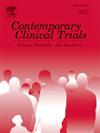Protocol of a randomized controlled trial into guided internet-delivered cognitive behavioral therapy for insomnia in autistic adults (i-Sleep Autism)
IF 2
3区 医学
Q3 MEDICINE, RESEARCH & EXPERIMENTAL
引用次数: 0
Abstract
Background
Sleep problems, especially insomnia, are prevalent among autistic adults, affecting about 60 %, and significantly impact their quality of life. Internet-based cognitive behavioral therapy for insomnia (iCBT-I) could provide accessible and scalable treatment. Given the unique sensory- and information processing, and social challenges at play in autism, a tailored treatment approach may be essential to tackle sleep problems. Yet, interventions developed and tested specifically for autistic adults were scarce. Addressing this gap is crucial to meet the urgent need for effective insomnia treatments in this population.
Methods
With this two-arm, parallel, superiority randomized controlled trial, we will assess the effectiveness of a guided iCBT-I intervention for adults (N = 160) with autism and insomnia (i-Sleep Autism). In co-creation, i-Sleep Autism has been adjusted from an existing intervention (i-Sleep). Inclusion criteria are: age ≥ 18, an ASD diagnosis, and at least sub-threshold insomnia (Insomnia Severity Index ≥10). Participants are randomly assigned to either i-Sleep Autism or an information only waitlist control condition (online psychoeducation and sleep hygiene). After 6 weeks, the control group receives the intervention. Insomnia severity is the primary outcome. Secondary outcomes include pre-sleep arousal, general mental health, depression, anxiety, daily functioning, and quality of life. Assessments will occur at baseline, mid-intervention (3 weeks), post-intervention (6 weeks), and at 6-month follow-up (the intervention group). Linear mixed-effect regression models are employed to evaluate the effectiveness of i-Sleep Autism, alongside exploration of potential moderators and mediators.
Conclusion
This trial can reveal whether autistic adults with insomnia benefit from a guided e-health intervention.
Trial registration: NL-OMON56692.
针对自闭症成人失眠症(i-Sleep Autism)的互联网指导认知行为疗法随机对照试验方案。
背景:睡眠问题,尤其是失眠,在成年自闭症患者中非常普遍,约占 60%,严重影响了他们的生活质量。基于互联网的失眠认知行为疗法(iCBT-I)可以提供方便、可扩展的治疗。鉴于自闭症患者独特的感官和信息处理能力以及社交障碍,量身定制的治疗方法对解决睡眠问题至关重要。然而,专门针对成人自闭症患者开发和测试的干预措施却很少。要满足自闭症人群对有效失眠治疗的迫切需求,填补这一空白至关重要:通过这项双臂、平行、优势随机对照试验,我们将评估针对患有自闭症和失眠症的成人(N = 160)的指导性 iCBT-I 干预(i-Sleep Autism)的有效性。i-Sleep Autism 是在现有干预措施(i-Sleep)的基础上调整而成。纳入标准为:年龄≥18岁,确诊为自闭症,失眠程度至少低于阈值(失眠严重程度指数≥10)。参与者被随机分配到 i-Sleep Autism 或仅提供信息的候补对照组(在线心理教育和睡眠卫生)。6 周后,对照组接受干预。失眠严重程度是主要结果。次要结果包括睡前唤醒、一般心理健康、抑郁、焦虑、日常功能和生活质量。评估将在基线、干预中期(3 周)、干预后(6 周)和 6 个月随访时进行(干预组)。采用线性混合效应回归模型来评估 i-Sleep Autism 的有效性,同时探讨潜在的调节因素和中介因素:这项试验可以揭示患有失眠症的自闭症成人是否能从有指导的电子健康干预中受益:试验注册:NL-OMON56692。
本文章由计算机程序翻译,如有差异,请以英文原文为准。
求助全文
约1分钟内获得全文
求助全文
来源期刊
CiteScore
3.70
自引率
4.50%
发文量
281
审稿时长
44 days
期刊介绍:
Contemporary Clinical Trials is an international peer reviewed journal that publishes manuscripts pertaining to all aspects of clinical trials, including, but not limited to, design, conduct, analysis, regulation and ethics. Manuscripts submitted should appeal to a readership drawn from disciplines including medicine, biostatistics, epidemiology, computer science, management science, behavioural science, pharmaceutical science, and bioethics. Full-length papers and short communications not exceeding 1,500 words, as well as systemic reviews of clinical trials and methodologies will be published. Perspectives/commentaries on current issues and the impact of clinical trials on the practice of medicine and health policy are also welcome.

 求助内容:
求助内容: 应助结果提醒方式:
应助结果提醒方式:


